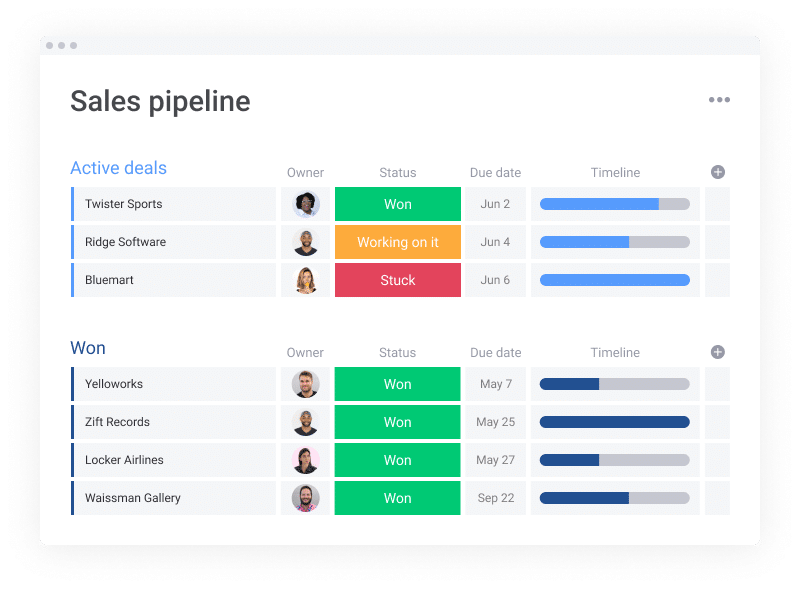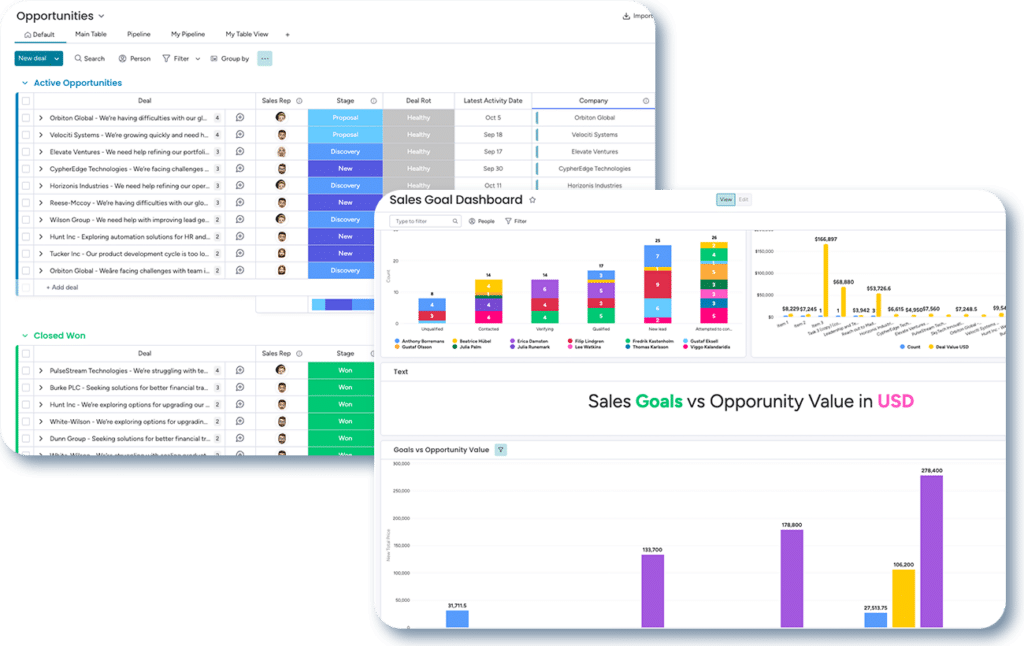Introduction
In the fast-paced world of business, where every second counts and efficiency is the key to success, streamlining sales processes with automation software solutions has become more than a convenience—it’s a necessity. The landscape of sales is evolving rapidly, adapting to technological advancements and changing consumer behaviours. This evolution demands an approach that not only keeps pace but also anticipates future trends.
Streamlining sales processes with automation software solutions isn’t just about adopting new technologies; it’s about reshaping the entire sales strategy to be more responsive, efficient, and effective. In this blog post, we’ll delve deep into how automation can transform your sales operations, making them more agile and results-oriented. Whether you’re a small startup or a large enterprise, the insights provided here will guide you through the myriad benefits of automating your sales processes, ultimately leading to heightened productivity and profitability.
Join us as we explore the dynamic world of sales automation, and learn how streamlining sales processes with automation software solutions can be your gateway to achieving unparalleled success in your sales endeavours.
Understanding the Sales Process
At the heart of every thriving business is a well-structured sales process, a roadmap guiding potential customers from the first point of contact to the final sale. Understanding this process is crucial in recognizing where streamlining sales processes with automation software solutions can make a significant impact.
The Sales Process Explained
The sales process typically involves several key stages: prospecting, connecting, qualifying leads, presenting offers, handling objections, closing the sale, and post-sale service. Each of these stages plays a vital role in converting leads into customers. However, without the right tools and strategies, this process can become cumbersome and inefficient, leading to missed opportunities and decreased revenue.
Challenges in Sales Operations
One of the main challenges in sales operations is managing the sheer volume of tasks and information. Sales representatives often juggle multiple leads, track communications, and update sales data. This complexity can lead to errors, inconsistencies, and delays. Streamlining sales processes with automation software solutions can address these challenges by automating repetitive tasks, organizing data, and providing valuable insights into customer behaviours and preferences.
In the following sections, we will explore how sales automation not only simplifies these tasks but also enhances the overall efficiency and effectiveness of your sales strategy. Streamlining sales processes with automation software solutions is not just about making life easier for your sales team; it’s about unlocking their full potential and driving your business towards greater success.
Identifying Bottlenecks in Traditional Sales Methods
In the quest to streamline sales processes with automation software solutions, it’s essential first to identify the bottlenecks that typically hinder traditional sales methods. These bottlenecks, often deeply ingrained in conventional practices, can significantly slow down sales cycles, affecting overall productivity and profitability.
Manual Data Entry and Management
One of the most time-consuming tasks in sales is manual data entry and management. Sales representatives spend a considerable amount of time inputting data into CRMs, tracking emails, and updating lead statuses. This not only eats into the time that could be spent on actual selling but also increases the risk of human error, leading to data inconsistencies and potential losses.
Inefficient Lead Tracking and Qualification
Another critical bottleneck in traditional sales methods is inefficient lead tracking and qualification. Without streamlined processes, sales teams often struggle to prioritize leads effectively, leading to missed opportunities and wasted resources on unqualified or low-potential leads.
Lack of Real-Time Analytics and Insights
Traditional sales methods often lack the capability to provide real-time analytics and insights. This shortfall makes it challenging to make informed, data-driven decisions, particularly in dynamic market environments where customer preferences and behaviours are constantly evolving.
Poor Integration Across Sales Channels
Finally, poor integration across various sales channels can lead to disjointed customer experiences and inefficiencies. In traditional settings, the lack of a unified system results in siloed information, making it difficult to provide a cohesive and seamless customer journey.
By recognizing these bottlenecks, businesses can better appreciate the need to streamline sales processes with automation software solutions.
Omnitas Newsletter
Sign up for our monthly newsletter to stay up-to-date on our latest blog articles, videos and events!
Thank you!
You have successfully joined our subscriber list.
The Role of Automation in Sales
As we delve deeper into the concept of streamlining sales processes with automation software solutions, it becomes clear that automation plays a pivotal role in transforming the sales landscape. By integrating automation into sales strategies, businesses can overcome traditional bottlenecks, enhancing efficiency and driving growth.
Enhancing Efficiency and Accuracy
Automation tools are designed to handle repetitive and time-consuming tasks, such as data entry, scheduling, and email follow-ups. By automating these processes, sales teams can dedicate more time to engaging with clients and pursuing new opportunities. Moreover, automation minimizes human error, ensuring data accuracy and consistency across sales channels.
Scalability and Adaptability
One of the significant advantages of streamlining sales processes with automation software solutions is scalability. Automation allows sales operations to scale up without proportionally increasing the workload or resources needed. This adaptability is crucial in today’s rapidly changing market, where businesses need to be agile to stay competitive.
Providing Real-Time Insights for Data-Driven Decisions
Automation software is not just about doing tasks faster; it’s also about doing them smarter. These solutions offer real-time analytics and insights, empowering sales teams to make data-driven decisions. Understanding customer behaviours, preferences, and trends becomes easier, allowing for more targeted and effective sales strategies.
Streamlining Lead Management and Customer Journey
Automation plays a crucial role in streamlining lead management and the overall customer journey. From lead nurturing to scoring and segmentation, automation ensures that potential customers receive personalized attention at every stage. This tailored approach significantly improves conversion rates and customer satisfaction.
Selecting the Right Automation Tools
When it comes to streamlining sales processes with automation software solutions, choosing the right tools is crucial for achieving the desired outcomes. The market is flooded with a plethora of options, each promising to revolutionize your sales process. However, selecting the most suitable one requires a strategic approach tailored to your specific business needs.
Assessing Your Sales Process Needs
The first step in selecting the right automation tools is to thoroughly assess your current sales processes. Identify the areas that are most time-consuming or prone to errors. This could range from lead generation and follow-ups to data analysis and customer relationship management. Understanding these needs will guide you in choosing a tool that addresses your specific challenges.
Integration Capabilities
It’s essential to choose automation software that seamlessly integrates with your existing systems, such as CRM, email platforms, and social media channels. Streamlining sales processes with automation software solutions is most effective when there is a harmonious integration, ensuring data flows smoothly across all platforms, enhancing overall efficiency.
Scalability and Flexibility
Consider the scalability and flexibility of the automation tool. As your business grows, your sales automation needs will evolve. The ideal tool should be able to scale up accordingly and adapt to changing business environments without requiring a complete overhaul of your sales process.
User-Friendliness and Support
The usability of the automation tool is another vital factor. It should have an intuitive interface that your sales team can easily adapt to. Additionally, reliable customer support and training resources from the tool provider are crucial for a smooth transition and ongoing operation.
Cost-Effectiveness
Finally, evaluate the cost-effectiveness of the automation tool. While it’s tempting to opt for the most feature-rich option, it’s important to consider the return on investment. A tool that aligns with your sales goals and budget while offering essential functionalities is often the best choice.
Impact on Revenue and Customer Relationships
Understanding the direct impact of streamlining sales processes with automation software solutions on both revenue and customer relationships is crucial for businesses seeking to invest in these technologies. The adoption of automation in sales not only drives efficiency but also significantly boosts revenue and enhances customer experiences.
Boosting Revenue through Enhanced Efficiency
One of the most tangible benefits of sales process automation is the substantial increase in revenue. By automating routine tasks, sales teams can focus more on revenue-generating activities like closing deals and developing relationships with potential clients. Automation also ensures faster lead response times, which is critical in today’s fast-paced market where customers expect quick and efficient service. Faster response times often lead to higher conversion rates and, consequently, increased revenue.
Personalized Customer Experiences
Streamlining sales processes with automation software solutions enables businesses to offer more personalized customer experiences. Automation tools can track customer preferences, purchase history, and engagement, allowing sales teams to tailor their approach to each customer’s unique needs. This level of personalization fosters stronger customer relationships, leading to higher customer satisfaction and loyalty.
Consistent Customer Interactions
Automation ensures consistency in customer interactions, which is vital for building trust and credibility. Whether it’s through personalized email campaigns, consistent follow-ups, or timely customer support, automation helps maintain a uniform level of service quality. This consistency is key in establishing a strong brand reputation and encouraging repeat business.
Data-Driven Customer Insights
Finally, automation provides valuable data-driven insights into customer behaviours and preferences. These insights enable businesses to make informed decisions about product development, marketing strategies, and sales approaches. Understanding customer needs and trends ensures that businesses stay ahead of the curve, offering products and services that meet and exceed customer expectations.
By leveraging automation to streamline sales processes, businesses can achieve a dual benefit: a significant boost in revenue and the cultivation of stronger, more meaningful customer relationships. These outcomes are critical in today’s competitive market, where customer satisfaction and financial performance are closely intertwined.

Integrating Automation into Your Sales Strategy
The journey to streamline sales processes with automation software solutions involves more than just selecting the right tools. It’s about strategically integrating these solutions into your existing sales strategy to maximize efficiency and effectiveness. This integration should be thoughtful and aligned with your business goals to ensure a smooth transition and optimal results.
Step-by-Step Guide to Implementation
- Assessment and Planning: Start by assessing your current sales processes to identify areas that can benefit most from automation. This could include lead management, customer follow-ups, or data analysis.
- Selecting Suitable Automation Tools: Based on your assessment, choose automation tools that best fit your needs. Consider factors like integration capabilities, scalability, user-friendliness, and cost.
- Integration with Existing Systems: Ensure that the selected tools integrate seamlessly with your existing CRM and other sales platforms. This integration is vital for maintaining data integrity and workflow continuity.
- Customization and Configuration: Customize and configure the tools to align with your specific sales processes and goals. Tailoring these tools to your unique requirements is essential for achieving the desired outcomes.
Aligning Automation with Sales Goals
Integrating automation into your sales strategy should be aligned with your overarching sales goals. Whether it’s increasing lead conversions, enhancing customer engagement, or improving sales cycle efficiency, your automation efforts should directly contribute to these objectives. This alignment ensures that every automated process is purposeful and adds tangible value to your sales operations.
Monitoring and Continuous Improvement
Once automation is integrated, it’s crucial to continuously monitor its performance and impact. Use metrics and KPIs to track improvements in efficiency, customer engagement, and revenue growth. Regular monitoring allows for timely adjustments and ensures that the automation tools are effectively contributing to your sales strategy.
Overcoming Challenges and Resistance
Integrating new technologies often comes with challenges, including resistance from sales teams accustomed to traditional methods. Addressing these challenges involves providing comprehensive training, highlighting the benefits of automation, and actively seeking feedback for ongoing improvements.
By strategically integrating automation into your sales strategy, you’re not just streamlining sales processes with automation software solutions; you’re revolutionizing the way your sales team operates. This strategic approach leads to enhanced efficiency, higher sales productivity, and a stronger competitive edge in the market.
Training and Adoption Best Practices
Successfully streamlining sales processes with automation software solutions requires not just technological integration but also effective training and adoption practices. These practices ensure that your sales team is well-equipped to utilize the new tools to their fullest potential, leading to smoother operations and better results.
Developing a Comprehensive Training Program
- Customized Training Sessions: Tailor training sessions to address the specific functionalities of the automation tools you’ve implemented. This customization ensures that your sales team understands how these tools align with their daily tasks.
- Hands-On Workshops: Conduct hands-on workshops that allow team members to interact with the software in real-time. Practical experience is key to building confidence and proficiency in using these tools.
Encouraging Team Engagement and Feedback
- Open Communication Channels: Establish open channels for communication where team members can express their concerns and feedback about the new tools. This open dialogue helps in identifying any issues early and ensures that team members feel heard and supported.
- Incentivizing Adoption: Consider incentivizing the adoption of these tools through recognition or rewards. This approach can motivate the team to actively engage with the new technology.
Providing Continuous Support and Resources
- Ongoing Support: Offer ongoing support and resources, such as access to technical help and advanced training sessions. Continuous support is vital in addressing any challenges that arise as the team gets accustomed to the automation tools.
- Resource Library: Create a resource library with guides, FAQs, and best practices. Having readily available information aids in quick problem-solving and encourages self-learning.
Monitoring Progress and Making Adjustments
- Regular Check-Ins: Schedule regular check-ins to monitor the team’s progress and the overall impact of the automation tools on sales processes. These check-ins can help identify areas for improvement and ensure that the tools are being used effectively.
- Adapt Training Based on Feedback: Be prepared to adapt your training program based on the team’s feedback and the evolving needs of your sales operations. Flexibility in training ensures that it remains relevant and effective.
By implementing these training and adoption best practices, you’re not only streamlining sales processes with automation software solutions but also fostering a culture of continuous learning and adaptation. This approach ensures that your sales team is fully capable and confident in leveraging automation to enhance their performance and drive sales success.
Conclusion
Throughout this exploration of streamlining sales processes with automation software solutions, we’ve uncovered the transformative power of automation in sales. From identifying bottlenecks in traditional methods to implementing cutting-edge tools, it’s clear that automation is not just a luxury but a necessity in today’s sales landscape. Embracing automation leads to enhanced efficiency, improved customer relationships, and significant revenue growth.
monday.com: A Game-Changer in Sales CRM Automation
An exemplary tool in this realm is monday.com‘s sales CRM, a platform that epitomizes the effectiveness of automation in sales processes. monday.com offers a suite of automation capabilities designed to simplify and streamline every aspect of your sales strategy. The platform’s intuitive design ensures that your sales team can easily navigate and harness these powerful tools, translating to more time spent on meaningful sales interactions and less on manual tasks.
Experience the Power of monday.com with Omnitas
At Omnitas, we understand the intricacies of sales process automation and the critical role it plays in business growth. We specialize in helping companies like yours leverage the full potential of tools like monday.com’s sales CRM. Our team of experts is adept at tailoring these solutions to fit your unique business needs, ensuring seamless integration and maximum impact.
Book Your Free Consultation
Are you curious about how monday.com can revolutionise your sales processes? Do you want to see firsthand how automation can enhance your sales strategy and results? We invite you to book a free consultation call with us at Omnitas below. During this call, we’ll discuss your specific needs, demonstrate the capabilities of monday.com, and outline a customised plan to streamline your sales processes with automation software solutions.
If you enjoyed this article, make sure to sign up for our monthly newsletter below to stay in the loop about all things business automation and efficiency!













